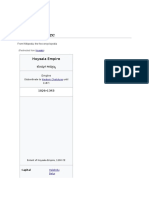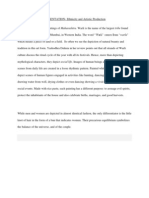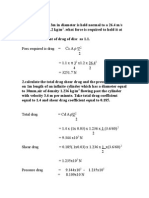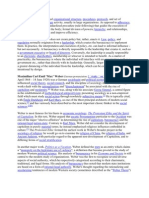Anti Hindi Agitation
Anti Hindi Agitation
Uploaded by
Angela LopezCopyright:
Available Formats
Anti Hindi Agitation
Anti Hindi Agitation
Uploaded by
Angela LopezOriginal Description:
Copyright
Available Formats
Share this document
Did you find this document useful?
Is this content inappropriate?
Copyright:
Available Formats
Anti Hindi Agitation
Anti Hindi Agitation
Uploaded by
Angela LopezCopyright:
Available Formats
Anti-Hindi agitations of Tamil Nadu
The Anti-Hindi agitations of Tamil Nadu were a series of agitations that happened in the Indian state of Tamil
Nadu (formerly Madras State and part of Madras Presidency) during both pre- and post-Independence periods.
The agitations involved several mass protests, riots, student and political movements in Tamil Nadu, and
concerned the official status of Hindi in the state and in the Indian Republic.
The first anti-Hindi agitation was launched in 1937, in opposition to the introduction of compulsory teaching of
Hindi in the schools of Madras Presidency by the first Indian National Congress government led by C.
Rajagopalachari (Rajaji). This move was immediately opposed by E. V. Ramasamy (Periyar) and the opposition
Justice Party (later Dravidar Kazhagam). The agitation, which lasted three years, was multifaceted and involved
fasts, conferences, marches, picketing and protests. The government responded with a crackdown resulting in
the death of two protesters and the arrest of 1,198 persons including women and children. The mandatory Hindi
education was later withdrawn by the British Governor of Madras Lord Erskine in February 1940 after the
resignation of the Congress Government in 1939.
Adoption of an official language for the Indian Republic was a hotly debated issue during the framing of the
Indian Constitution after India's independence from Britain. After an exhaustive and divisive debate, Hindi was
adopted as the official language of India with English continuing as an associate official language for a period
of fifteen years, after which Hindi would become the sole official language. The new Constitution came into
effect on 26 January 1950. Efforts by the Indian Government to make Hindi the sole official language after
1965 were not acceptable to many non-Hindi Indian states, who wanted the continued use of English. The
Dravida Munnetra Kazhagam (DMK), a descendant of Dravidar Kazhagam, led the opposition to Hindi. To
allay their fears, Prime Minister Jawaharlal Nehru enacted the Official Languages Act in 1963 to ensure the
continuing use of English beyond 1965. The text of the Act did not satisfy the DMK and increased their
skepticism that his assurances might not be honoured by future administrations.
As the day (26 January 1965) of switching over to Hindi as sole official language approached, the anti-Hindi
movement gained momentum in Madras State with increased support from college students. On 25 January, a
full-scale riot broke out in the southern city of Madurai, sparked off by a minor altercation between agitating
students and Congress party members. The riots spread all over Madras State, continued unabated for the next
two months, and were marked by acts of violence, arson, looting, police firing and lathi charges. The Congress
Government of the Madras State, called in paramilitary forces to quell the agitation; their involvement resulted
in the deaths of about seventy persons (by official estimates) including two policemen. To calm the situation,
Indian Prime Minister Lal Bahadur Shastri gave assurances that English would continue to be used as the
official language as long the non-Hindi speaking states wanted. The riots subsided after Shastri's assurance, as
did the student agitation.
The agitations of 1965 led to major political changes in the state. The DMK won the 1967 assembly election
and the Congress Party never managed to recapture power in the state since then. The Official Languages Act
was eventually amended in 1967 by the Congress Government headed by Indira Gandhi to guarantee the
indefinite use of Hindi and English as official languages. This effectively ensured the current "virtual indefinite
policy of bilingualism" of the Indian Republic. There were also two similar (but smaller) agitations in 1968 and
1986 which had varying degrees of success.
Their views were reflected in the following pronouncement of Krishnamachari (was finance minister in 1956
during Nehru period):
We disliked the English language in the past. I disliked it because I was forced to learn Shakespeare and Milton,
for which I had no taste at all. If we are going to be compelled to learn Hindi, I would perhaps not be able to
learn it because of my age, and perhaps I would not be willing to do it because of the amount of constraint you
put on me. This kind of intolerance makes us fear that the strong Centre which we need, a strong Centre which
is necessary will also mean the enslavement of people who do not speak the language at the centre. I would, Sir,
convey a warning on behalf of people of the South for the reason that there are already elements in South India
who want separation..., and my honourable friends in U.P. do not help us in any way by flogging their idea of
"Hindi Imperialism" to the maximum extent possible. So, it is up to my friends in Uttar Pradesh to have a whole
India; it is up to them to have a Hindi-India. The choice is theirs.
[33][39]
Official Languages Act of 1963
As the deadline stipulated in Part XVII of the Constitution for switching to Hindi as primary official language
approached, the central government stepped up its efforts to spread Hindi's official usage. In 1960, compulsory
training for Hindi typing and stenography was started. The same year, India's president Rajendra Prasad acted
on the Pant Committee's recommendations and issued orders for preparation of Hindi glossaries, translating
procedural literature and legal codes to Hindi, imparting Hindi education to government employees and other
efforts for propagating Hindi.
[44]
To give legal status to Nehru's assurance of 1959, the Official Languages Act was passed in 1963.
[62]
In Nehru's
own words:
This is a Bill, in continuation of what has happened in the past, to remove a restriction which had been placed
by the Constitution on the use of English after a certain date i.e. 1965. It is just to remove that restriction that
this is placed.
[37]
The Bill was introduced in Parliament on 21 January 1963. Opposition to the Bill came from DMK members
who objected to the usage of the word "may" instead of "shall" in section 3 of the Bill. That section read: "the
English language may...continue to be used in addition to Hindi". The DMK argued was that the term "may"
could be interpreted as "may not" by future administrations. They feared that the minority opinion would not be
considered and non-Hindi speakers' views would be ignored. On 22 April, Nehru assured the parliamentarians
that, for that particular case "may" had the same meaning as "shall". The DMK then demanded, if that was the
case why "shall" was not used instead of "may". Leading the opposition to the Bill was Annadurai (then a
Member of the Rajya Sabha). He pleaded for an indefinite continuation of the status quo and argued that
continued use of English as official language would "distribute advantages or disadvantages evenly" among
Hindi and non-Hindi speakers. The Bill was passed on 27 April without any change in the wording. As he had
warned earlier, Annadurai launched state wide protests against Hindi.
[37][59][63][64]
In November 1963, Annadurai
was arrested along with 500 DMK members for burning part XVII of the Constitution at an anti-Hindi
Conference.
[65]
He was sentenced to six months in prison.
[66]
On 25 January 1964, a DMK member,
Chinnasamy, committed suicide at Trichy by self-immolation, to protest the "imposition of Hindi". He was
claimed as the first "language martyr" of the second round of the anti-Hindi struggle by the DMK.
[67]
Nehru died in May 1964 and Lal Bahadur Shastri became Prime Minister of India. Shastri and his senior cabinet
members Morarji Desai and Gulzari Lal Nanda were strong supporters of Hindi being the sole official language.
This increased the apprehension that Nehru's assurances of 1959 and 1963 will not be kept despite Shastri's
assurances to the contrary.
[64]
Concerns over the preference of Hindi in central government jobs, civil service
examinations and the fear that English would be replaced with Hindi as medium of instruction brought students
into the anti-Hindi agitation camp in large numbers.
[68]
On 7 March 1964, the chief minister of Madras State, M.
Bhaktavatsalam at a session of the Madras Legislative Assembly recommended the introduction of Three-
language formula (English, Hindi and Tamil) in the state.
[69]
Apprehension over the Three-language formula
increased student support for the anti-Hindi cause.
[50]
Agitation of 1986
In 1986, Indian Prime minister Rajiv Gandhi introduced the "National Education Policy".
[96]
This education
policy provided for setting up Navodaya Schools, where the DMK claimed teaching of Hindi would be
compulsory.
[97]
The Anna Dravida Munnetra Kazhagam (ADMK) led by M. G. Ramachandran (which had split
from the DMK in 1972), was in power in Tamil Nadu and the DMK was the main opposition party.
Karunanidhi announced an agitation against the opening of Navodaya Schools in Tamil Nadu. On 13
November, the Tamil Nadu Legislative Assembly unanimously passed a resolution demanding the repeal of
Part XVII of the constitution and for making English the sole official language of the union.
[98][99][100]
On 17 November 1986, DMK members protested against the new education policy by burning Part XVII of the
Constitution.
[98]
20,000 DMK members including Karunanidhi were arrested.
[100]
21 persons committed suicide
by self-immolation.
[101]
Karunanidhi was sentenced to ten weeks of rigorous imprisonment. Ten DMK MLAs
including K. Anbazhagan were expelled from the Legislative Assembly by the speaker P. H. Pandian.
[98]
Rajiv
Gandhi assured Members of Parliament from Tamil Nadu that Hindi would not be imposed.
[102]
As part of the
compromise, Navodhaya schools were not started in Tamil Nadu. Currently, Tamil Nadu is the only state in
India without Navodhaya schools.
[103]
You might also like
- Drag Reduction MethodsDocument6 pagesDrag Reduction MethodsAngela LopezNo ratings yet
- Lectures On International Economic RelationsDocument143 pagesLectures On International Economic Relationssherfboy100% (2)
- DELAPENA - Reflection4Document1 pageDELAPENA - Reflection4Cee100% (1)
- HoysalaDocument29 pagesHoysalaPriya AnandNo ratings yet
- Sources of Ancient Indian History 1Document32 pagesSources of Ancient Indian History 1mluluNo ratings yet
- HISTORYDocument26 pagesHISTORYSudip Patra100% (1)
- The Moderate Phase of The Indian National Movement Modern Indian History For UPSCDocument3 pagesThe Moderate Phase of The Indian National Movement Modern Indian History For UPSC3070 Ayush PandeyNo ratings yet
- National Flag: History of Indian TricolorDocument34 pagesNational Flag: History of Indian TricolorSuvra Pattanayak100% (1)
- Subaltern AssignmentDocument5 pagesSubaltern Assignmentagnihotriarti45No ratings yet
- Romilia Thapar Interpretations of Indian History (25-36)Document13 pagesRomilia Thapar Interpretations of Indian History (25-36)navya mehtaNo ratings yet
- Imperialist HistoriographyDocument3 pagesImperialist Historiographytiewkhongwir77No ratings yet
- India After IndependenceDocument11 pagesIndia After IndependenceAmitNo ratings yet
- Religion and Society in Medieval IndiaDocument8 pagesReligion and Society in Medieval Indiasreya guha100% (1)
- Meaning of Bhakti MovementDocument3 pagesMeaning of Bhakti MovementAditya NemaNo ratings yet
- The Emergence of BuddhismDocument8 pagesThe Emergence of BuddhismMsaif.jamalNo ratings yet
- History Optional Notes: Delhi SultanateDocument89 pagesHistory Optional Notes: Delhi SultanateHarshNo ratings yet
- Persian - Literature During Sultanate PeriodDocument5 pagesPersian - Literature During Sultanate PeriodRaheet KumarNo ratings yet
- Delhi SultansDocument53 pagesDelhi SultansmushtaqNo ratings yet
- Article of Dynasty Politics in IndiaDocument4 pagesArticle of Dynasty Politics in IndiaShikha ShuklaNo ratings yet
- Cambridge School of ThoughtDocument8 pagesCambridge School of ThoughtSandeep Rai100% (1)
- A Legacy of Religious Tolerance in India: Ashoka, Akbar, and Conquest by RighteousnessDocument9 pagesA Legacy of Religious Tolerance in India: Ashoka, Akbar, and Conquest by RighteousnessAditya SinghNo ratings yet
- Paper - 13 History of IndiaDocument177 pagesPaper - 13 History of IndiaKristine ReyesNo ratings yet
- Reorganisation of States in IndiaDocument1 pageReorganisation of States in IndiaGaurav PrabhakerNo ratings yet
- About Harappan Town PlanningDocument7 pagesAbout Harappan Town PlanningAnonymous tQgCnSBKmONo ratings yet
- Anglo French Carnatic WarsDocument9 pagesAnglo French Carnatic Warssantosh kumarNo ratings yet
- Module - 3: The Golden PeriodDocument6 pagesModule - 3: The Golden PeriodTejaswi SinghNo ratings yet
- State and Society in Medieval IndiaDocument8 pagesState and Society in Medieval IndiaAiswaryaNo ratings yet
- Sumit Sarkar - THE SWADESHI MOVEMENT IN Bengal 1903-1908Document457 pagesSumit Sarkar - THE SWADESHI MOVEMENT IN Bengal 1903-1908Aparajay SurnamelessNo ratings yet
- TantrismDocument3 pagesTantrismAryan chibNo ratings yet
- Characteristics of Early Mediaeval IndiaDocument7 pagesCharacteristics of Early Mediaeval Indiamama thakur100% (1)
- Itcs-Ch 1Document21 pagesItcs-Ch 1The One100% (1)
- Abu Zafar Siraj-Ud-Din Muhammad Bahadur Shah ZafarDocument8 pagesAbu Zafar Siraj-Ud-Din Muhammad Bahadur Shah ZafarSyed Arslan BukhariNo ratings yet
- Gupta AdministrationDocument3 pagesGupta AdministrationNipun MudgalNo ratings yet
- Partition of IndiaDocument10 pagesPartition of IndiaDeep singhNo ratings yet
- Aristocratic RevoltDocument2 pagesAristocratic RevoltIan Adams100% (2)
- 17 Indo-Islamic Architecture (Indian Culture Series - NCERT) PDFDocument7 pages17 Indo-Islamic Architecture (Indian Culture Series - NCERT) PDFsarawalem1No ratings yet
- Kautilyas Mandala Theory and Its Current RelevanceDocument2 pagesKautilyas Mandala Theory and Its Current RelevanceAnshika PatelNo ratings yet
- Pillars of Ashoka - Wikipedia, The Free EncyclopediaDocument6 pagesPillars of Ashoka - Wikipedia, The Free Encyclopediapankajsharma2k3No ratings yet
- Chapter 10 Cliff Notes PDFDocument8 pagesChapter 10 Cliff Notes PDFAriel GoldbergNo ratings yet
- MauryasDocument6 pagesMauryasKritika MalikNo ratings yet
- Mughalempire PDFDocument20 pagesMughalempire PDFAngad KumarNo ratings yet
- Rig Vedic Polity PDFDocument7 pagesRig Vedic Polity PDFShadow HackzNo ratings yet
- Maratha EmpireDocument7 pagesMaratha EmpireImranMatanat100% (1)
- British Rule and Its Impact On IndiaDocument158 pagesBritish Rule and Its Impact On Indiaverender sehwagNo ratings yet
- Delhi Sultanate - WikipediaDocument101 pagesDelhi Sultanate - WikipediaMuhammad Wazed UllahNo ratings yet
- Delhi SultanateDocument24 pagesDelhi SultanateAditya sharma0% (1)
- Akbars Religious Policy PDFDocument8 pagesAkbars Religious Policy PDFAbhinav TripathiNo ratings yet
- Regionalism Art and Architecture of The Regional Styles (North India)Document15 pagesRegionalism Art and Architecture of The Regional Styles (North India)T Series Ka BapNo ratings yet
- South India UrbanisationDocument5 pagesSouth India Urbanisationpriyalnaik.15No ratings yet
- French Revolution and Its Universal Appeal: History IiiDocument26 pagesFrench Revolution and Its Universal Appeal: History IiiAgniv DasNo ratings yet
- Art and Architecture of Vijayanagara EmpireDocument4 pagesArt and Architecture of Vijayanagara Empireray mehtaNo ratings yet
- Rise of The MarathasDocument17 pagesRise of The MarathasTanishq MalhotraNo ratings yet
- Warli ArtDocument9 pagesWarli Artlubna_rahman2002No ratings yet
- Short Note On Gandhara School of Art and ArchitectureDocument4 pagesShort Note On Gandhara School of Art and ArchitectureviplavMBA100% (2)
- Administration in Medieval IndiaDocument34 pagesAdministration in Medieval IndiabhavikaNo ratings yet
- Madras Mahajana SabhaDocument2 pagesMadras Mahajana SabhaSreeja Vinod0% (1)
- Archaeology in Kerala - Exploration of Its HistoryDocument75 pagesArchaeology in Kerala - Exploration of Its HistoryVinduja VinNo ratings yet
- Socio ReformersDocument13 pagesSocio ReformersDr-Payal BaseraNo ratings yet
- The Tribes and Castes of the Central Provinces of India, Book IIFrom EverandThe Tribes and Castes of the Central Provinces of India, Book IINo ratings yet
- Paper PDFDocument8 pagesPaper PDFAngela LopezNo ratings yet
- C1Document27 pagesC1Angela Lopez100% (1)
- Samsung HCRDocument12 pagesSamsung HCRAngela LopezNo ratings yet
- 1.review of Basic Fluid MechanicsDocument1 page1.review of Basic Fluid MechanicsAngela LopezNo ratings yet
- Eastboro Machine Tools Corporation: Exhibit 1Document10 pagesEastboro Machine Tools Corporation: Exhibit 1Angela Lopez100% (1)
- Hindustan Lever Limited: HUL's Entry Into Bread Is A Strategic Extension of The Company's Wheat BusinessDocument1 pageHindustan Lever Limited: HUL's Entry Into Bread Is A Strategic Extension of The Company's Wheat BusinessAngela LopezNo ratings yet
- The Only Way To Know How Customers See Your Product Is To Look at It Through Their Eyes" Daniel R Scroggin, CEO, TGI FridayDocument1 pageThe Only Way To Know How Customers See Your Product Is To Look at It Through Their Eyes" Daniel R Scroggin, CEO, TGI FridayAngela LopezNo ratings yet
- Recent Years Have Brought MinorityDocument1 pageRecent Years Have Brought MinorityAngela LopezNo ratings yet
- 3) in Your Industry, Who Are "Good" and Who Are "Bad" Competitors? Why?Document2 pages3) in Your Industry, Who Are "Good" and Who Are "Bad" Competitors? Why?Angela LopezNo ratings yet
- J&G DistributorsDocument6 pagesJ&G DistributorsAniket YevalkarNo ratings yet
- Common Grammar Mistakes ThatDocument1 pageCommon Grammar Mistakes ThatAngela LopezNo ratings yet
- Lex Facit ArbitrumDocument20 pagesLex Facit ArbitrumKaran VyasNo ratings yet
- Brief Introduction To LawDocument6 pagesBrief Introduction To LawAtty. Mia BaquianoNo ratings yet
- Aboitiz Shipping Corp. vs. GAFLACDocument3 pagesAboitiz Shipping Corp. vs. GAFLACAbigayle RecioNo ratings yet
- M.A. Political Science - Semester I & IIDocument29 pagesM.A. Political Science - Semester I & IIVinay Girotra0% (1)
- Ligaya Gapusan-Chua Vs CADocument5 pagesLigaya Gapusan-Chua Vs CAXtine CampuPotNo ratings yet
- History 120 - Final Paper - NARODITSKYDocument13 pagesHistory 120 - Final Paper - NARODITSKYDaniel NaroditskyNo ratings yet
- VBDDocument17 pagesVBDPraloy Chowdhury CM VBD Comilla DistrictNo ratings yet
- Max WeberDocument18 pagesMax Weberaryanparmar81No ratings yet
- CorpDocument14 pagesCorpIELTSNo ratings yet
- CIA Role in 1975 Bangladesh CoupDocument17 pagesCIA Role in 1975 Bangladesh CoupSuprah50% (2)
- Wendy Greuel Policy SpeechDocument9 pagesWendy Greuel Policy SpeechDakotaSmithLATNo ratings yet
- Health and Safety at Work Act 2015Document189 pagesHealth and Safety at Work Act 2015OONNo ratings yet
- Premium Marble Resources Vs - CADocument5 pagesPremium Marble Resources Vs - CAEnan IntonNo ratings yet
- Article 230. Public Officer Revealing Secrets of Private Individual. - Any Public Officer To Whom The Secrets of AnyDocument12 pagesArticle 230. Public Officer Revealing Secrets of Private Individual. - Any Public Officer To Whom The Secrets of AnyReyes BeeNo ratings yet
- Stonehill v. Diokno (1967) Ponente: Concepcion, C.JDocument1 pageStonehill v. Diokno (1967) Ponente: Concepcion, C.JRabelais MedinaNo ratings yet
- North Carolina Community College SystemDocument136 pagesNorth Carolina Community College SystemDreamACTivistNo ratings yet
- Ong Vs SandiganbayanDocument14 pagesOng Vs SandiganbayanMaeBartolomeNo ratings yet
- CNA Standard Operating ProcedureDocument5 pagesCNA Standard Operating ProcedureAndrew Mayes ElNo ratings yet
- 5dnl Unit4Document21 pages5dnl Unit4api-423460735No ratings yet
- Somalia - Hunger and Struggle For Displaced Communities in Besieged Xudur TownDocument6 pagesSomalia - Hunger and Struggle For Displaced Communities in Besieged Xudur TownUNSOM (The United Nations Assistance Mission in Somalia)No ratings yet
- VisionIAS Monthly Current Affairs October 2023Document119 pagesVisionIAS Monthly Current Affairs October 2023Saurabh MeenaNo ratings yet
- Department of Homeland Security 2010 Warning On Pressure CookersDocument2 pagesDepartment of Homeland Security 2010 Warning On Pressure CookersFoxNewsInsiderNo ratings yet
- Financial Oversight and Management Board For Puerto Rico: MembersDocument2 pagesFinancial Oversight and Management Board For Puerto Rico: MembersEmily RamosNo ratings yet
- Cook County Sheriff Tom Dart Sued - Minor Child RapedDocument15 pagesCook County Sheriff Tom Dart Sued - Minor Child RapedTrue News-usaNo ratings yet
- Inventory of Bank Accounts As of June 2019Document96 pagesInventory of Bank Accounts As of June 2019Tim PuertosNo ratings yet
- Criminal Procedure Notes Based On RianoDocument19 pagesCriminal Procedure Notes Based On RianoKatherine Christy Rosal LigcubanNo ratings yet
- 98 Phil 364 - Salaysay Vs CastroDocument7 pages98 Phil 364 - Salaysay Vs CastroJun RinonNo ratings yet
- 2 Complaint-With-Application-For-Preliminary-InjunctionDocument4 pages2 Complaint-With-Application-For-Preliminary-InjunctionIanLightPajaro100% (1)





































































































